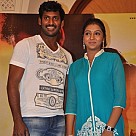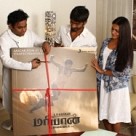PHOTOS & STILLS - GALLERY

CONNECTIONS AND CONVERSATIONS
Life was so much simpler when 'Apple' and 'Blackberry' were just fruits. At least we remembered two dozen phone numbers without having to scroll down the phonebook on your mobile handset or lose most important contacts when your cell phone got lost, stolen or just went dead. The other day, my brand new Nokia Lumia 920 hung and froze like a demo piece even before the EMIs could get paid off in full leaving me in the communication lurch of being disconnected with the far, dear and official ones for almost a day. Switching over to a micro Sim for Lumia also meant that I can't swap it to my old loyal Samsung phone that requires a regular-sized Sim card, unless I bought another new Simcard with the same number. Considering so many complications and Nokia's strict warnings on the warranty card that any problem with the phone should only be handled and fixed at an authorized service center, I didn't fiddle with it much until I found time to visit a store and was finally told that it was just a software hang up glitch that got sorted out by switching it on again like a computer and fully charging it. While I felt relieved about not replacing, repairing or resetting the handset, I was amused about the extent of dependence on an electronic gadget for everything we do in our routine and how the lack of it makes one realize the convenience that we otherwise take for granted.
Between the time my phone display went blank where callers could hear the ringtone but I couldn't and till it got operational, I got back to my humble landline that was all along neglected and lying in one corner of the living room. I was glad to have not surrendered the connection despite each of us in the family having a mobile of our own. And when I had to step out of the house, I co-ordinated a meeting through the humble landline for the exact time and place of meeting someone and reached the place on-the-dot waiting for the other person to come just like the good old disciplined days when mobiles were non-existent. Staying connected today is imperative but instant connection without waiting is the key to evolution of communication technology. Let alone a world without instant communication through mobile (including WhatsApp,Viber), social media platforms (fb, twitter) or internet mailing, with time even the world of movies has evolved and kept pace in the script, scenes and lyrics arena in tune with the changing times.
I came across an interesting Tamizh film script that got shortlisted in a national competition recently. The story progresses through letters – written in war time by an army officer to his wife. The officer is killed during battle, and the story takes a twist when the letters are opened by the enemy. The film is set in the mid 80s, and therefore the relevance and style of moving the plot forward with every letter being opened by different characters at different points seemed fresh.
In real life in the 80s, before the advent of email, the excitement of waiting for more than a week to get a reply, the personal touch in handwritten words and the wave of nostalgia when you clear your cupboard someday all had a certain charm. In reel life, such instruments of communication have been used at various points in movies, each mirroring the era that the film belonged to.
When a postman got introduced in a scene with the familiar 'Saar, Thandhi', the audience would immediately be all ears to know if it carries good news or bad news. Telegram was the fastest in those days and it would often feature in scenes heralding emergency situations. One shot of a letter / note left on the table or bed, fluttering in the breeze and being held with a paper weight, most often denoted not-so-pleasant suicide notes to running away messages for the character that discovered it. Today a letter is probably used to take the frustration out at her husband as in the Tamizh movie 'Pizza' that released this year, where the wife unconventionally leaves behind a letter full of rightful affectionate abuses for the husband to discover, read it and make peace with her when she gets back home. What you cannot say it in person, a letter takes on the role and even finishes a story the way Bhumika leaves behind a note for Jyothika about her faithful husband Surya in the movie 'Jillunu Oru Kaadhal'. In the film 'P.S. I love you' starring Gerard Butler (Gerry) and Hillary Swank (Holly), Gerry arranges to deliver a series of meaningful messages through periodical letters even after he passes away to help Holly move on in life and overcome her fear of falling in love again.
Another important gadget of communication, the much-forgotten landline once used to bring in those desired effects of characters overhearing cancer illness conversations and extra marital affairs by the spouse and have always acted as a link to take the story forward. In the movie Azhagan, KB sir would almost treat the phone as another character in the film… starting with confusion through eaves-dropping by a nosy brother-in-law, the final climax with Geetha sorting out the differences between the lead pair - Mammootty and Bhanupriya - and one entire song featuring them conversing over the phone all night.
Evolution of technology has brought about a change in not just the use of gadgets but also the way we communicate. Husbands and wives text from one room to another, sons living abroad monitor their parents' health back home with a video chat. Relationships are called off over a one liner email. Most actions tend to be impulsive and at times devoid of emotion. Somehow when communication still basked in the glory of ‘snail mail’, emotions seemed deeper because the person got more ‘thinking time’.
We just need to decide in this frenzied world of ours if we need ‘emails’ or ‘emotions’.
Take away emails, give me emotions any time, and give me the good old handwritten letter any day. I think I will go back and read that wonderful script once again.
Behindwoods is not responsible for the views of columnists.
COMMENTS
OTHER LATEST COLUMNS
ANUJA IYER'S OTHER COLUMNS
- 100 and not out
- Galatta Kalyaanam
- Connections and conversations
- An hour with Haasan
- Eulogy
- Does age matter?
- Any Votes for devotion?
- The whole six yards
- Rejuvenating Revathy
- Madras Nalla Madras
- Audience beware
- Smile OK Please.
- Changing with the times
- Staging Live
- Lateral Triangle
- How to name it
- A magical morning
- Chromosome XX
- The difficulty of being good
- Whats In A Day
- Why this Pogaveri?
RELATED LINKS
- 100 and not out
- Galatta Kalyaanam
- Senza Spa Saloon Launch - Videos
- An hour with Haasan
- Eulogy
- Does age matter?
- Does age matter? I II
- Anuja Iyer unveils Ultralite Fusion Silk
- Panithuli Premier Show - Photos
- Anuja Iyer Launch Palam Silks - Videos
- Anuja Iyer At Sri Palam Silks - Photos
- Celebs watch Hunger Games
- Anuja Iyer Interview - Videos
- Vinmeengal Music Review
- Vinmeengal Movie Preview











